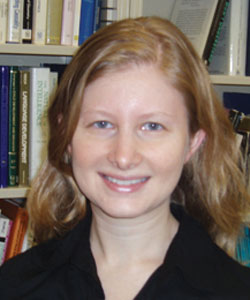Marjorie Rhodes
 Marjorie Rhodes
Marjorie Rhodes
New York University
http://psych.nyu.edu/cdsc/home.php
What does your research focus on?
I am interested in how the human mind acquires, organizes, and uses abstract knowledge. In particular, my research aims to identify the basic conceptual organization that underlies our understanding of the social world and to discover how these concepts develop. Classifying people into categories (e.g., girls, babies, doctors) is a fundamental component of how we make sense of our social experiences. Thus, one of my key goals is to discover how social categories develop across childhood.
What drew you to this line of research and why is it exciting to you?
My initial research in graduate school examined the development of biological categorization —how young children parse the natural world into meaningful kinds (e.g., animal species). As I learned about the fundamental role of categorization in conceptual development, I began to wonder how categorization shapes children’s understanding of people and social behavior. I found this to be an exciting question for several reasons. First, because it is theoretically challenging — a successful theoretical account of social categorization must describe a conceptual system that is flexible enough to account for wide cultural variation, constrained enough to support the rapid acquisition of social categories in early childhood, and also powerful enough to dramatically shape a wide range of cognitive and behavioral processes. Second, because social categorization underlies some pervasive social problems (e.g., contributing to stereotyping, prejudice, and discrimination), understanding how social categorization develops can inform efforts to prevent the development of these negative phenomena.
Who were/are your mentors or scientific influences?
I have had wonderful mentors. Susan Gelman, my mentor in graduate school, exemplifies the essence of a good scientist. From her, I learned to think deeply about theory, creatively about research methods, and broadly about the role of developmental work in shaping our understanding of cognition. I was also fortunate to be mentored by Henry Wellman, who helped me to think about the relation of my work to our broader understanding of social cognition. They both set exceptionally high standards for science and mentorship, which I hope to carry with me throughout my academic career.
What’s your future research agenda?
I am currently fascinated by two key questions. First, of all the possible ways that people can be categorized (e.g., by gender, race, age, language, religion, interests, hair color, and so on), how do children determine which ways are meaningful and informative in their environment? We think that this process involves the interplay between intuitive cognitive biases and cultural input. To examine how this process works in detail, we are currently testing the roles of language, parent-child conversation, and cultural context in shaping the development of social categorization. Second, what is the basic conceptual organization of social categories? To answer this question, we are testing the types of inferences and behaviors that social categories support across development.
What publication are you most proud of?
I am very proud of our recent publication: Rhodes, M., Leslie, S. J., & Tworek, C. (2012). Cultural transmission of social essentialism. Proceedings of the National Academy of Sciences, 109, 13526–13531. This paper presents a three-year research endeavor examining the role of language in the development of social categorization. One thing that is special about this paper is that we were able to examine two complementary processes: (a) how hearing certain forms of language shapes the development of social categorization, and (b) how parental beliefs lead them to produce certain types of language in conversations with their children. Looking at both of these processes allowed us to describe a comprehensive picture of the role of language in the development of social categorization. I am also proud of this work because it is the product of a wonderful interdisciplinary collaboration with Sarah-Jane Leslie, a philosophy professor at Princeton. Because of our interdisciplinary approach, we were able to design our studies to have broad theoretical implications for cognitive science.





APS regularly opens certain online articles for discussion on our website. Effective February 2021, you must be a logged-in APS member to post comments. By posting a comment, you agree to our Community Guidelines and the display of your profile information, including your name and affiliation. Any opinions, findings, conclusions, or recommendations present in article comments are those of the writers and do not necessarily reflect the views of APS or the article’s author. For more information, please see our Community Guidelines.
Please login with your APS account to comment.